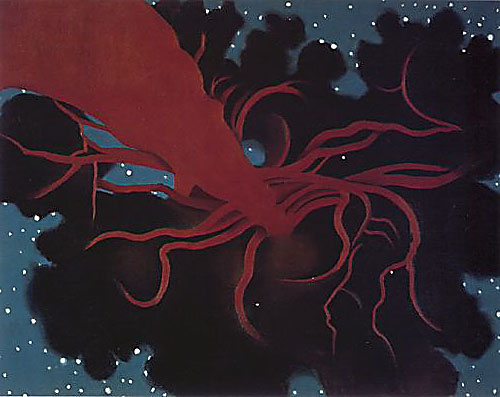PAINTING THE SUNRISE, THE SUNSET
AND TWILIGHT
AND TWILIGHT
USE THESE HELPFUL WORKSHEETS
IF YOU DO NOT KNOW
HOW TO DRAW TREES
Paint your trees black
On watercolor paper or illustration board, use waterproof ink or diluted acrylic paint.
On canvas board use acrylic paint.
It is very important to choose a waterproof media for the trees. Set your picture aside and let the trees dry.
After you have allowed your black tree silhouettes to dry, decide on a color scheme for your sky.
IMPORTANT:
Before painting your sky,
Click here to read my post, color theory 101 and
Click here to read my post on Impressionism
Pick a dominant color scheme for your sky
If you are painting a sunrise or sunset,
choose predominantly warm colors
If you are trying to capture the colors of twilight, try using predominantly cool colors:
If you are using both warm and cool colors, paint the cool sections of your picture first
(leave the sections where you plan on painting your warm colors white until your entire painting is dry).
When it is time to add your warm colors, start with a clean palette to avoid unwanted color combinations.
Use enough water when painting your sky
to create smooth brush strokes.
Keep some newspaper handy and test out your brush on it to control the amount of paint and water you are using.
Start at the edge of the trees and
paint away from the branches.
Use a square shading brush to create clean edges.
Use horizontal brush strokes to depict a calm sky
Use diagonal brush strokes to depict a windswept sky
You can completely alter the mood of your painting by the colors you choose and the direction of your brush strokes.
Watch the video below to learn why sun rises and sunsets look different:
When you are done with the sky, allow your painting to dry once more and then use black paint, one last time, to touch up your silhouettes.
To learn how to create the pine trees, practice painting the trunks on a piece of scrap paper. Then dry brush the branches and needles using a fan brush for texture. Keep in mind that the branches get smaller the higher you go, forming a rough, irregular triangular shape and not a perfect, sculpted and trimmed Christmas tree shape (trees in a wild landscape aren't manicured by gardeners). Compare your brushwork to photographs of real trees until you are happy with the results.
Here are some of my reference photographs of skies that you can use to create your background.
The Sky reference photograph album uses Flash player and may not be visible on some mobile devices. To view the slide show on a mobile device, click here.
|
Millet was Van Gogh's favorite artist. Van Gogh did not copy Millet's Starry Night. He gazed at the night sky and painted his own picture based on his own feelings and his own experiences. We cannot go outside at night to look at the night sky in art class but we can use the 'star walk' app on the classroom iPads to see what the sky would look like right now if it were a clear night with no light pollution. Can you create your own personal 'Starry Night'? How do artists learn from other artists without copying? How do artists develop their own ideas from observation and experience? http://vitotechnology.com/ Each individual artist, Looking out at the night, will see something different. What do you see when you look at the evening sky? How will your painting look? |
 |
| Georgia O'Keeffe, The Lawrence Tree, 1929 |
Watch the video below to discover how the silhouette of a distant planet, as it orbits a far away star, teaches scientists about alien solar systems
Gallery
Acrylic paintings by 7th grade students
Student Gallery 2013
5th-8th grade students
Student Gallery 2017, Grade 8 bilingual students:
Using Adobe Photo Shop
to plan your color scheme
 |
| Unfinished Student Painting |
 |
| Selection Tool:Highlights Gradient Tool:Warm Colors |
 |
| Selection Tool: Highlights Gradient Tool:cool colors |







































This information is really worthy and please provide me some new content along with best bookmarking sites .. and please keep posting more information.
ReplyDeleteart entertainment